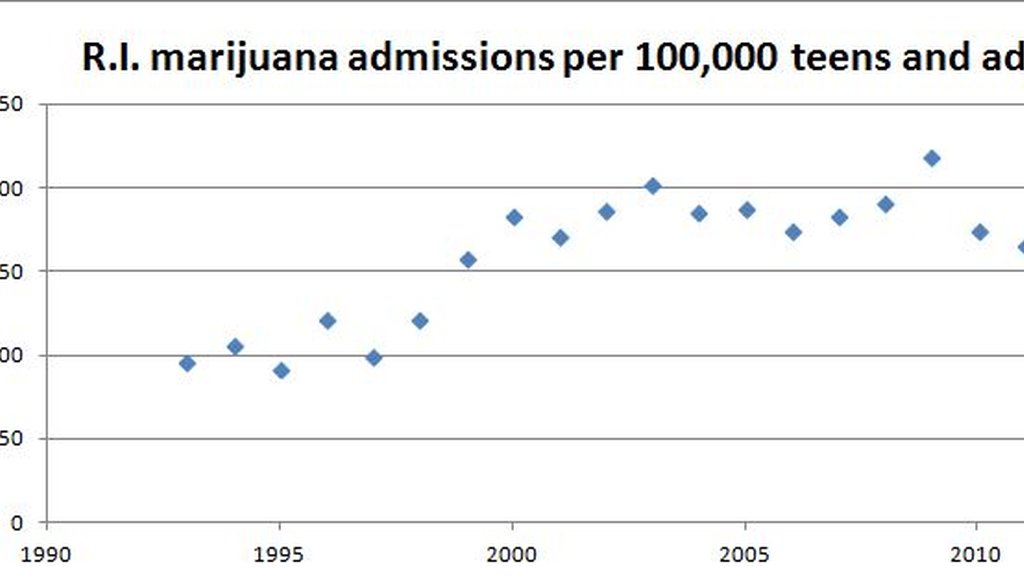

Our only agenda is to publish the truth so you can be an informed participant in democracy.
We need your help.


Source: Treatment Episode Data Set (TEDS) as complied by the U.S. Substance Abuse & Mental Health Services Administration.
When the House Judiciary Committee was considering legislation to tax and regulate marijuana, Kathleen Sullivan, Warren’s substance abuse coordinator, stepped forward to warn the committee about the dangers of marijuana use.
"We do know that the proportion of Rhode Islanders entering substance abuse treatment primarily due to marijuana use has reached its highest point in 20 years," she told the committee during the April 29 hearing.
When we contacted her for details, she emailed statistics collected from the states by the U.S. Substance Abuse & Mental Health Services Administration. Her data on admissions for substance abuse treatment, primarily for marijuana, ranged from 1993 through 2011, a year shy of the 20 years she spoke of.
According to those statistics, the rate of admissions in 1993 was 96 per 100,000 Rhode Islanders age 12 and older. In 2011, the rate was 166 admissions.
But this wasn’t the highest that the rate has ever been over the past two decades.
It peaked at 218 in 2009 and then declined in the next two years. The number of admissions, unadjusted for population, peaked that year as well, and then dropped.
When we looked at the number of admissions that the federal agency reported online for 2012 and 2013, we found that the decline has continued, showing a drop each year since 2009.
In her email, Sullivan qualified her statement saying: "I was referring to the overall trend in marijuana admissions."
So we took another look at the data and examined the trend in admission rates, even though she didn’t make this distinction in her testimony.
The trend from beginning to end for admissions per 100,000 teens and adults has been up over the past two decades. But if you look at the trend line since 1999, there has been no statistically significant increase.
We also contacted the U.S. Substance Abuse & Mental Health Services Administration directly and officials there told us there are limitations to the data that make Sullivan's position problematic.
One major problem is that an individual can be counted more than once each year depending on how many times he or she has been admitted for treatment, explained Kelley Smith, a statistician with the administration's Center for Behavioral Health Statistics and Quality.
Smith said the data, known as the Treatment Episode Data Set or TEDS, do not support the assertion that the number of Rhode Islanders entering substance abuse treatment has reached its highest point in 20 years.
"Not according to TEDS," Smith said in an email. "According to TEDS, the percentages have remained relatively stable."
Our ruling
Kathleen Sullivan said the proportion of Rhode Islanders entering substance abuse treatment, primarily for marijuana, has reached its highest point in 20 years.
Her documentation shows a peak in 2009, but then admissions decline through 2011. More recent data show the decline has continued. Further, our trend analysis shows no increase since 1999.
And a federal statistician at the agency that compiled the data said admission rates have been "relatively stable" over the past 20 years.
We rate her statement False.
Email, Kathleen Sullivan, substance abuse coordinator, Warren, May 6, 2015.
SAMHSA.gov, Treatment Episode Data Set, 2013, accessed May 8, 2015, and Treatment Episode Data Set, Admissions 1992-2012, received May 12, 2015 from the Substance Abuse and Mental Health Services Administration
Email, Bradford Stone, spokesman, Substance Abuse and Mental Health Services Administration, and Kelley Smith, statistician, SAMHSA’s Center for Behavioral Health Statistics and Quality, May 11, 2015
In a world of wild talk and fake news, help us stand up for the facts.
